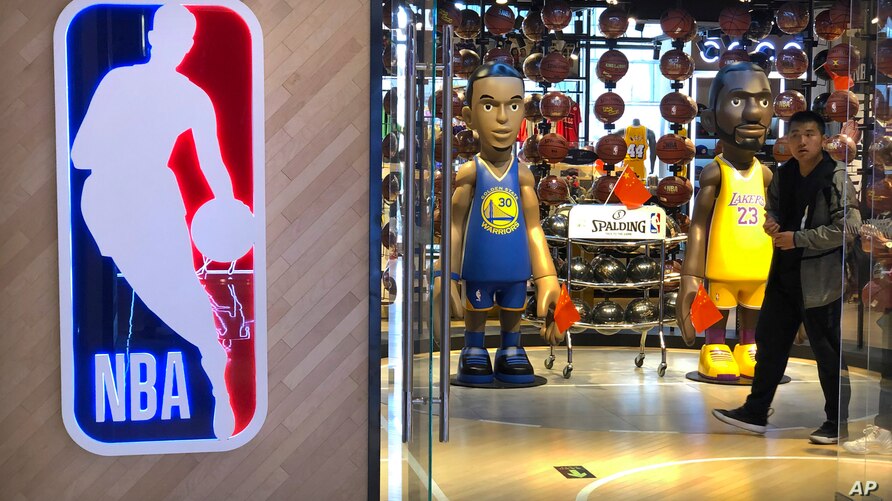By: Legu Zhang
Sports fans on Thursday found they could no longer order customized apparel from the National Basketball Association’s official website after the organization sparked a major backlash by appearing to ban the phrase “FreeHongKong” from customized jerseys.
Days ago, sports reporters noticed that when customers typed “FreeHongKong” as the customizable message on an NBA jersey, the system would return a message that said “we are unable to customize this item with the text you have entered. Please try a different entry.”
The website later said it was a technical error and the problem “has been fixed,” hours after the discovery was posted on Twitter and went viral.
However, days after the incident, customers can no longer find the option to customize their apparel on the NBA’s online store.
Fox News cited an NBA spokesperson who confirmed that the process for ordering personalized apparel had been disabled.
“Based on attempts to include violent, abusive and hateful messages on personalized NBA jerseys, the personalization feature has been disabled on NBAStore.com,” the spokesperson said. It’s unclear what messages fans were trying to publish that ran afoul of the rules.
The NBA’s decision to stop producing the jerseys is the latest free-speech controversy for a professional sports league that has often been in the news in the past year over the political views of its players and staff.
In October last year, the Houston Rockets’ general manager drew criticism from China after he tweeted a message of support for Hong Kong pro-democracy protesters. Chinese officials and basketball fans erupted with criticism, calling for the executive to be fired. The executive apologized, but for months, the incident cast a cloud over the league’s lucrative business relationships in China.
Senator Josh Hawley, a Missouri Republican, cited that incident when he wrote an open letter to NBA Commissioner Adam Silver, accusing the NBA of kowtowing to Beijing.
“The truth is that your decisions about which messages to allow and which to censor – much like the censorship decisions of the CCP [Chinese Communist Party] – are themselves statements about your association’s values,” Hawley wrote.
What about BLM?
NBA critics in the United States say the league’s position on speech involving sensitive issues in China contrasts with its position on the Black Lives Matter movement against systemic racism in the United States. This month, the NBA agreed to allow players to wear jerseys with approved messages associated with BLM, such as “Stand Up,” “Vote” and “I Can’t Breathe.”
China is one of the NBA’s biggest markets. Conservative estimates put the league’s annual revenue from China at $500 million, and NBA China, a business arm of the league, is worth an estimated $4 billion.
Anders Corr, publisher of the Journal of Political Risk, told VOA that basketball players should have the right to determine any message that they want to put on their jerseys, “including support for the U.S., the police, the military; support for HK, Uighurs, Black Lives Matter.”
Martin Thorley, a researcher of Chinese politics at the U.K.-based University of Nottingham, argued that the situation with the NBA is emblematic of a much wider problem regarding Western businesses and China.
He said that as organizations, these groups tend to value maximizing shareholder value above all else. The Chinese market is of great value to groups like the NBA, but that market can be used by the CCP as a tool. Many groups, valuing the potential colossal profits from the Chinese market, choose to self-censor to protect their market share.
“What we are seeing with the NBA and others is the conflict at the heart of this equation. Many inside Western commercial groups are privately appalled by what they are witnessing, in terms of Hong Kong and Xinjiang, for example,” Thorley told VOA in an email.
Corr said the American government should pass new laws that would require U.S. corporations to follow U.S. national interests.
“The government should require U.S. corporations to follow U.S. strategic interests wherever China or Russia or any of our enemies is pressuring them otherwise,” he told VOA, “We cannot compete with China on a global stage unless we at least match them on the toughness of their policies.”
Hands-off approach
The U.S. government usually takes a hands-off approach to dictating corporate strategy overseas, but it does bar companies from bribing foreign officials or evading U.S. sanctions.
Corr cited legislation passed by Congress in 1977 as an example of what new legislation could resemble. At the time, in response to the Arab League boycott of Israel, Congress made it illegal for U.S. companies to cooperate with any unsanctioned foreign boycott.
According to the Commerce Department, the legislation “had the effect of preventing U.S. firms from being used to implement foreign policies of other nations which run counter to U.S. policy.” (VOA News)





